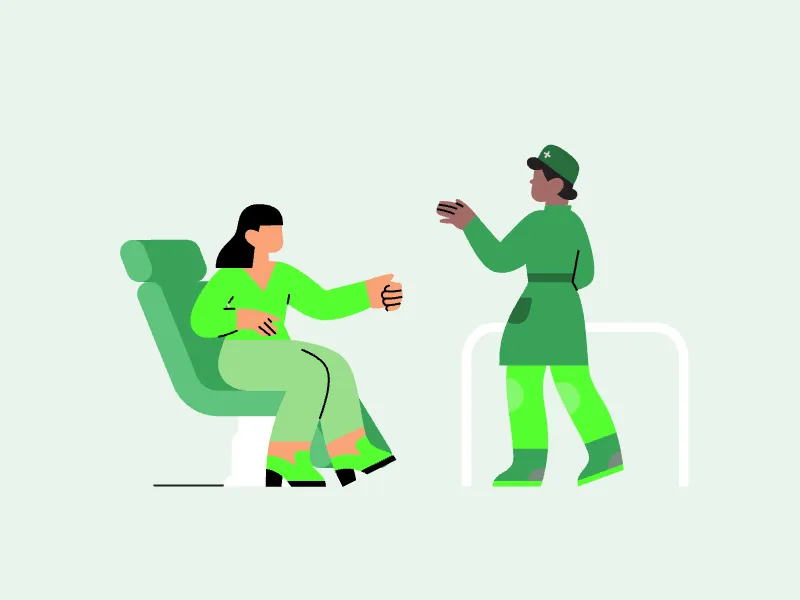Comorbid depression and eating disorders: The numbers
Depression is a common mental health disorder, with an estimated 8.4% of U.S. adults experiencing an episode of depression within the previous year, as of 2020, according to one study.1 Eating disorders are less common, with recent reports indicating 1.2% of adults have binge eating disorder within a given year, and 0.3% have bulimia. Furthermore, 0.6% of adults will experience anorexia at some point during their lives.2
While eating disorder behaviors may not be as prevalent as depression, it is common for individuals with eating disorders to have other psychiatric diagnoses. A study of over 2,000 women receiving treatment for an eating disorder found 94% of them had a co-occurring mood disorder, with depression being the most common co-occurring diagnosis.2 Eating disorders are relatively rare in the population as a whole, but many individuals with these conditions also live with depression.
How do depression and eating disorders interact?
Research shows depression is widespread among individuals who live with an eating disorder. There are several explanations for this overlap. For instance, genetic risk factors can make a person vulnerable to both depression and eating disorders. Furthermore, depression may increase a person’s risk of developing an eating disorder later, which can explain the interaction between these two conditions.4
In addition, some overlapping psychological and social factors can contribute to both eating disorders and depression:4
- Perfectionistic personality
- History of being bullied
- Poor body image
- Rigid thinking patterns
- Lack of social support
While there is no single cause of co-occurring depression and eating disorders, there are risk factors that can contribute to the development of both conditions.
Depression and eating disorders by eating disorder diagnosis
There is an interaction between depression and eating disorders, but depression rates can vary among individual eating disorder diagnoses. Below is the breakdown of how depression can overlap with the three most common eating disorders in the Diagnostic and Statistical Manual of Mental Disorders (DSM-5).
Depression + anorexia nervosa
National data shows a significant overlap between depression and anorexia nervosa (AN). Within their lifetimes, 42.1% of people with anorexia will experience a mood disorder, which is the category that encompasses depression.2
Depression + bulimia nervosa
Depression may be even more common among individuals with bulimia nervosa (BN), as 70.7% of those with this eating disorder will be diagnosed with a mood disorder at some point during their lives.2
Depression + binge eating disorder
Depression is also common among those with binge eating disorder (BED). The lifetime prevalence of a co-occurring mood disorder in people who live with binge eating is 46.4%.2
Treating co-occurring depression and eating disorders
Treatment for eating disorders and depressive symptoms can vary based on each individual’s unique needs and eating disorder diagnosis. Most important is receiving a comprehensive treatment plan that addresses the eating disorder, the depression, and all other aspects affecting the person’s health and well-being. If depression is left untreated, eating disorder symptoms may return, and vice versa.
Find out how remote treatment can help with anorexia
Learn more > Assessment
Treatment begins with a thorough assessment, in which a team of professionals evaluates eating disorder symptoms and physical and mental health and functioning in various areas of life, such as in relationships and at work or school. The treatment plan will then address any areas of need.
Nutrition and medical assessment
Often, individuals will work with a dietitian throughout the recovery process to ensure they receive adequate nutrition. In addition, a doctor may be part of the treatment team to address any underlying medical conditions and severe symptoms resulting from the eating disorder. Finally, a therapist will address the underlying issues that led to depression and an eating disorder.
Therapies
A specific type of counseling called cognitive behavioral therapy (CBT) is often used to treat depression, and the research shows that it can also be effective in treating eating disorders.5 In cognitive behavioral therapy, patients can learn to overcome negative thoughts about themselves and replace them with more balanced ways of thinking, which can alleviate depression symptoms, disordered eating habits, and distorted thoughts about food and body image.
Other types of psychotherapy have also been found to be effective. They include:6,7,8,9,10,11
- Acceptance and commitment therapy (ACT)
- Cognitive behavioral therapy (CBT)
- Cognitive remediation therapy (CRT)
- Dialectical behavioral therapy (DBT)
- Emotionally focused therapy (EFT)
- Exposure therapy
- Internal family systems (IFS)
- Interpersonal therapy (IPT)
In addition, many other therapies, practices, and activities can be helpful as a part of a comprehensive treatment plan for eating disorders, such as:
- Art therapy
- Dance therapy
- Meditation and mindfulness
- Movement therapy
- Music therapy
It may also be beneficial to engage in things like outdoor activities, sports, and yoga.
Ultimately, the best course of treatment for depression and eating disorders depends upon each individual’s needs. Contact our team at Within to begin the treatment process.






























